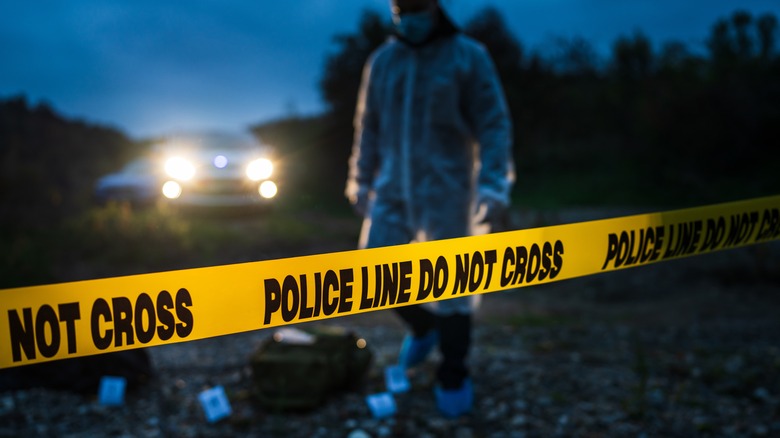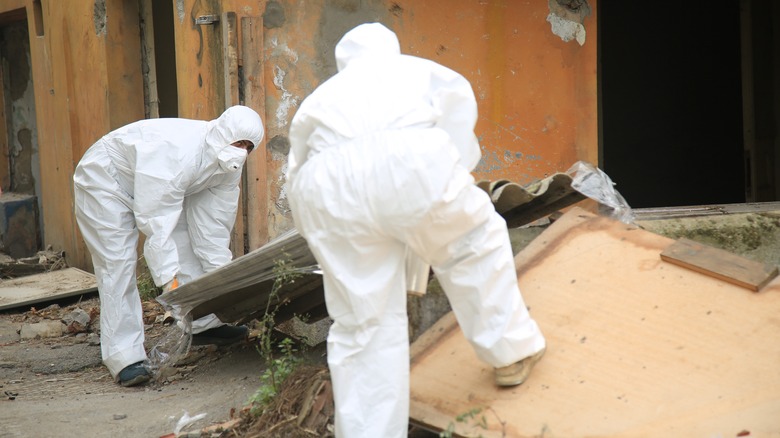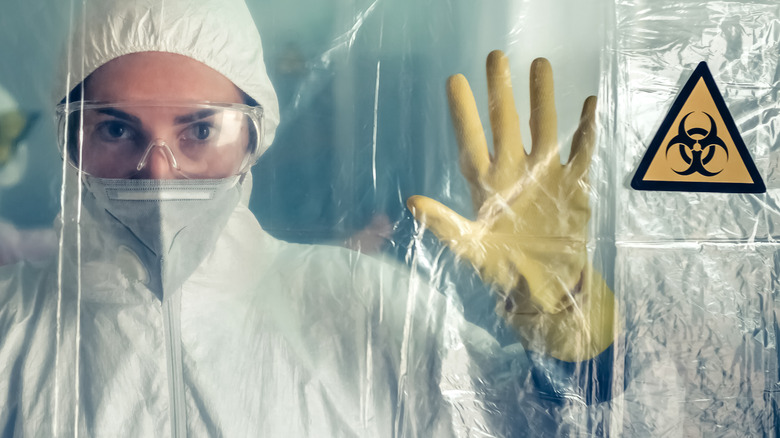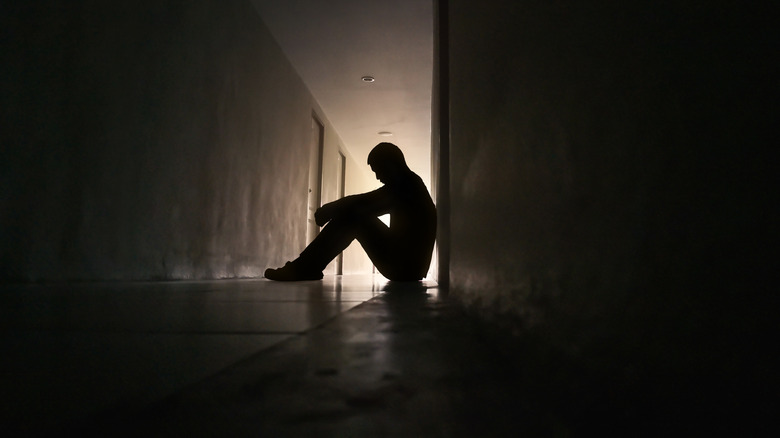This Is How You Can Become A Crime Scene Cleaner
There are many people involved in the processing of a crime scene. Police officers, detectives, forensic analysts, evidence technicians, and others comb through the scene to conduct an initial investigation and collect evidence to help solve the case. The time it takes to go through a crime scene depends on the severity of the situation, and all those involved follow protocols. The entire process can take several hours up to a few days.
After everything has been thoroughly processed, the property owners, business owners, or loved ones of the deceased call crime scene cleaners to properly dispose of waste and restore the location back to its original condition. Crime scene cleaners deal with different types of situations including homicides, scenes of accidents, suicides, and other types of crimes that leave debris, hazardous waste, human or animal fluids and waste, and other potentially dangerous materials (via Tough Nickel). Unknown to many, the crime scene cleanup industry is fairly young and only began in the '90s. Before that, the task of cleaning up fell to the family, friends, and loved ones of those involved in the crime.
Training needed to become a crime scene cleaner
There is no specific degree or field of study required for you to become a crime scene cleaner, and those in the industry come from a variety of backgrounds. However, it helps to have some education or knowledge about handling hazardous waste. As noted by Learn, most companies that offer crime scene cleaning services prefer to hire someone who has experience dealing with death, such as police officers, emergency responders, or ex-military personnel, as they may be able to deal with crime scenes better.
When it comes to instruction, companies offer on-the-job training to employees. You may also want to be certified in specializations, such as handling biohazard materials, pathogen training, and personal protective equipment training to ensure you know the proper handling and disposal of waste at a crime scene. As noted by Restoration Master Finder, certification is not a requirement, but it will boost your chances of being hired for the job, as crime scene cleanup companies follow OSHA (Occupational Safety and Health Administration) standards that not only ensure proper handling of waste but also protect crime scene cleaners from the risks involved in their line of work.
Useful skills to have as a crime scene cleaner
Being a crime scene cleaner is not for everyone. It's a difficult job that entails hours of manual labor, and those who are squeamish won't last. You have to deal with strong odors, gory scenes, human or animal waste, or insects, just to name a few. In an interview with A&E, Neal Smither, the founder of Crime Scene Cleaners, revealed that they conduct extensive training to see whether a person is right for the job. "Our training consists of trying to make you quit," he said. This ensures that only those who truly have the skills and heart for the job are the ones left behind. In addition, he stated that about 95% of his hires quit before their first month is over because of how labor-intensive the work is.
Crime scene cleaners must be meticulous and attention to detail is an important trait to have. The ability to follow protocols to the letter is also a must when dealing with dangerous waste. In addition, having high stamina also helps (via Learn). You are expected to do hours of physical labor while wearing protective gear, which can be uncomfortable, but necessary for your own safety. Those who aspire to be crime scene cleaners must also be flexible when it comes to schedules, as crimes happen 24/7 and you can be called to work at any time.
It takes an emotional toll
Although crime scene cleaners are trained to compartmentalize their feelings when cleaning crime scenes, the work still takes an emotional toll and can be stressful. Being at countless scenes of crimes affects a person, and it is important to have emotional support. You also have to be compassionate toward family members or friends who are present and are experiencing one of the worst events in their lives. Doug Baruchin, the president of Island Trauma Services, told The Atlantic in 2014 that witnessing the grief of loved ones is the most difficult part of the job. "Some people will be in shock, some will break down, some people will get in there with you and clean because it was somebody they knew," he said.
According to Spaulding Decon, it is recommended to seek a therapist or support group when you work as a crime scene cleaner, as it will help with processing different kinds of emotions that come with the job.
Looking for work
Do extensive research about companies that you want to work for, as they may have different requirements. You have a higher chance of getting hired if you have completed training or have certifications. When writing your resume, include skills, prior work experience, and other information relevant to the industry (via Apply for a Job). Check job sites and social media sites for open positions. Alternatively, you can directly contact crime scene cleaning companies near your area to inquire about job availabilities.
Reputable crime scene cleaning companies will do a background check and also give you a drug test. You have the chance to tell your potential employer why you are fit for the job during the interview, so it's best to have knowledge about the company you are applying to. Make sure to highlight the skills you have that are necessary for the job, and discuss past experiences that will help you become a good crime scene cleaner. When looking for work, also consider the benefits that come with the position, as being a crime scene cleaner comes with risks.
How much do crime cleaners make?
Based on statistics collected by Salary, the average base for a crime scene cleaner is about $31,000 per year as of August 2022. It's important to note that base salaries vary per city, with California and New York reported as having the highest paying cities that range from $37,000 to $39,000 yearly. Other states with the highest paying salaries for crime scene cleaners include Alaska, Massachusetts, and New Jersey. Salaries can reach up to $80,000 yearly, as reported by Tough Nickel, but that rate is typically for crime scene cleaners who deal with biohazards.
For most of the crime scene cleaners who last in the industry, the satisfaction of helping people during a difficult time is the most rewarding experience. Danielle Ahlstrom, who works for biohazard removal and trauma cleaning company Aftermath, said that although she has to sometimes sacrifice her personal life, knowing that she helps people makes the job easier. "The biggest benefit is walking away from a job and feeling good about the work we've done and how we've helped the family," she stated.





